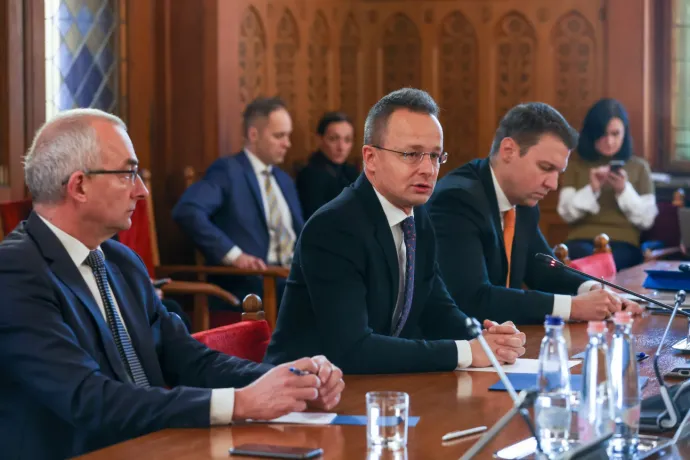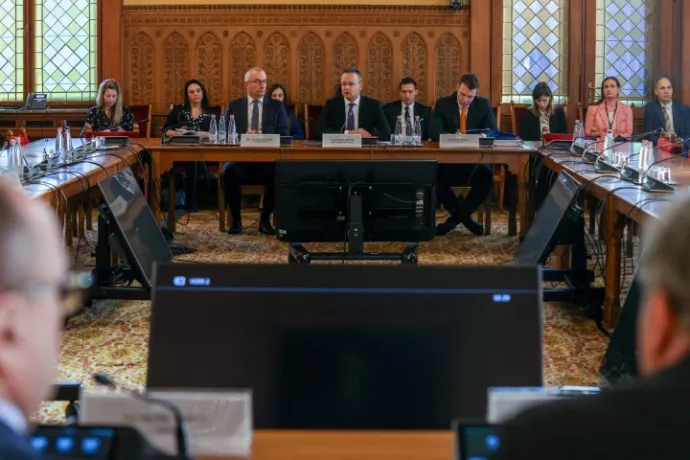
The Hungarian Parliament's Foreign Affairs Committee held a hearing of the Minister of Foreign Affairs and Trade on Monday morning. Among other things, Péter Szijjártó spoke about the consequences of the Russian-Ukrainian war, the latest developments in the Israel-Gaza conflict, the arrival of Asian guest workers to Hungary, and the planned meeting between Viktor Orbán and former Ukrainian President Petro Poroshenko which ended up being called off.
After the meeting of the committee, journalists asked Szijjártó what the former Ukrainian President Petro Poroshenko and Hungarian Prime Minister Viktor Orbán would have discussed. According to Szijjártó, Orbán is happy to talk to anyone, including former foreign leaders. "So, if former President Poroshenko was looking for such a consultation opportunity, we did not want to be an obstacle to it," the minister said. When asked by a journalist why the meeting had failed, he said: “You should ask the Ukrainians about that, about their domestic relations, about who allows what, to whom, and who wants to do away with the other. Thankfully, that's none of our business.”
He did not want to specify what the subject of the canceled meeting would have been and responded by saying "let's not get into that kind of science fiction". Although the Foreign Minister was vague, his words did suggest that the meeting may have been initiated by Poroshenko. "Does this mean that it was Poroshenko who initiated the meeting?"- the journalist of 444 asked. "Once again, when there are such initiatives, the Prime Minister usually receives them positively," Szijjártó replied. This can be interpreted as meaning that if Viktor Orbán is the one accepting the "initiative", then the Hungarian Prime Minister is not the initiator.
The Ukrainian secret service announced two days ago that former Ukrainian President Petro Poroshenko had been denied permission to travel abroad because he was supposed to meet Hungarian Prime Minister Viktor Orbán, and there was a risk that the meeting could be used as a tool by Russia.
The risks to global security affecting Hungary
Speaking at the hearing, the Hungarian Foreign Minister said that he believes global security is currently at its lowest level since the Cold War and that we, Hungarians are also feeling the effects of this. There's a war going on in Europe and in Europe's immediate surroundings, in the Middle East. And all this is compounded by a migration crisis, he added.
The minister believes that the most important goal of Hungary's foreign policy is to guarantee the country's security.
When the war broke out in neighbouring Ukraine, the strategy of the West was to introduce sanctions and arm Ukraine so that it would win. But according to Szijjártó, this strategy failed: it did not bring Russia to its knees, while the European economy suffered.
He said that those who say that the conflict must be resolved on the battlefield are wrong, that there was no solution on the battlefield, only death. He believes that the transatlantic region should admit that this strategy has failed and that peace is what is really needed.
Hungarian diplomacy has made it clear that Ukraine's NATO membership is unimaginable, he stressed.
Our clear expectation of Ukraine is that it would respect the rights of national minorities. He said that so far all promises made by Ukraine have turned out to be false.
Szijjártó does not know whether the current promises to broaden the use of languages of national minorities can be taken seriously, as just recently, the Ukrainian education minister had warned the country's schools that speaking Hungarian is not permitted until 5 pm.

On keeping the spirit of the Abraham Accords alive
On the Gaza-Israeli conflict, he said that the hope that a return to the spirit of the Abraham Accords would one day be possible must be kept alive. The minister pointed out that the Foreign Ministry had brought home all Hungarian citizens who had been stranded in Israel and Gaza and who wanted to come home. There are still two Hungarian citizens held hostage in Gaza, one of whom, unfortunately, we do not have any information about, so we can only hope that he is alive.
According to the minister, the growing terrorist threat in Europe is a direct consequence of the EU's support for illegal migration. He said that "we do not agree with the voices across Europe claiming that we need the "impetus" that the arrival of migrants brings.
Questions from committee members
Committee members from opposition parties then asked the minister about “migrant workers” from Asia taking the jobs of Hungarians, why the Hungarian government continues to support Israel’s war crime-stained intervention in Gaza, and why Hungary is paying Russia more than the market price for the gas imported from there, as well as why the Hungarian government failed to officially condemn Russia gaining full access to the Foreign Ministry’s networks.
In his combined answer to representatives of the opposition, Szijjártó said that the European economy is at a serious competitive disadvantage compared to that of China, but since the European and Chinese economies are so closely linked, the EU's idea of increasing the distance between the two is erroneous.
Europe has created a situation for itself where the batteries for electric cars, for example are manufactured in China. Szijjártó said that lumping together illegal migrants and foreign guest workers coming to Hungary is nonsense. He believes that it is impossible for a foreign worker to take a job away from a Hungarian. What we have in Hungary today is not mass unemployment, like we did in 2010, but a shortage of labourers, he said. Therefore, to a certain degree, in line with strict regulations, there's a need for foreign guest workers. The minister explained that if the Hungarian government did not act on this, multinational companies would move production from here to somewhere else, where there is no shortage of manpower.
According to Szijjártó, it is in Hungary's national interest to strive for a "sensible" relationship with Russia. As long as transporting Russian gas in a sack is not possible, gas pipelines are necessary.
Without Russia, we cannot supply ourselves with either oil or gas, he said. The Hungarian government did go to Brussels to ask for funds to wean us from Russian gas and to build more pipelines heading south, but in Brussels they said that in 15 years' time natural gas would not really be part of Europe's energy mix, so they wouldn't support it. Responding to a comment from Márton Tompos (Momentum) Szijjártó said it was a lie that Hungary is paying more than the market price for gas from Russia.
As for the future of the V4, he said that they still attach importance to the cooperation of the Visegrád countries, and that it is thanks to a joint action of the members that " we do not have tens of thousands of illegal migrants roaming around here".
As for Slovakia, there are difficult issues on the question of national minorities, which Szijjártó proposed should be addressed only once we can offer solutions.
After the hearing, journalists also asked Szijjártó what he thought about the bank loan worth several billion forints granted by MKB Bank (owned by Lőrinc Mészáros) for the financing of the French presidential campaign of Marine Le Pen in 2022, and whether he considered this an interference in the internal affairs of a sovereign country. The Foreign Minister refused to comment on a decision made by a Hungarian bank, and suggested that the journalist consult the bank about it instead.
For more quick, accurate and impartial news from and about Hungary, subscribe to the Telex English newsletter!